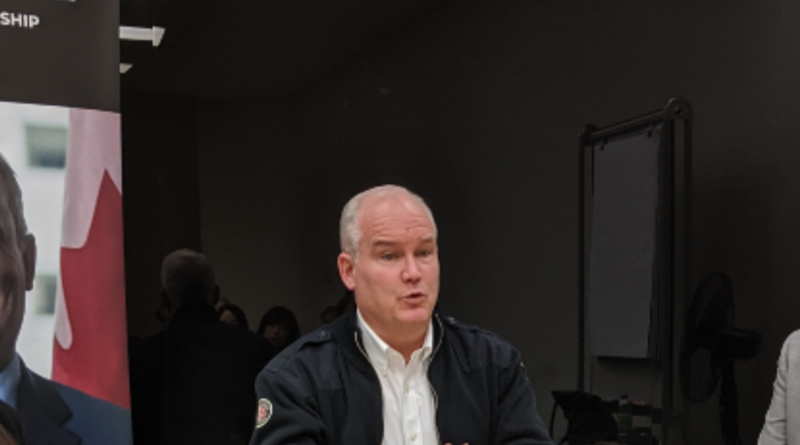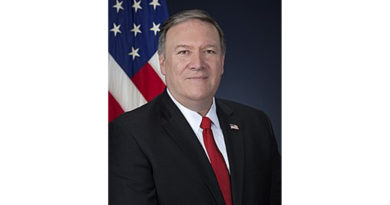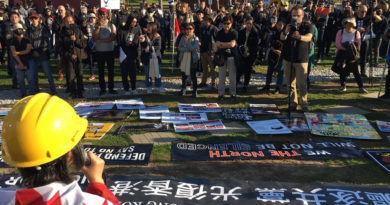奧圖爾:抗共新冷戰如箭在弦 Erin O’Toole on Wuhan Coronavirus: We are on the brink of a new Cold War with China
奧圖爾撰文指出世界正處臨戰狀態,繼蘇聯冷戰後另一次抗共戰爭一觸即發。本報譯文如下:
武漢肺炎的諸位中国吹哨者將名留青史。最初我等並不相信他們是懦夫,現在起,我們不會再重蹈覆轍。
The history books will remember the Chinese doctors who sounded the alarm about COVID-19 (editor: Wuhan Coronavirus). At first, we did not believe them and were timid. But now, we will never look the other way again
英國前首相邱吉爾在1946年描述,蘇維埃鐵幕籠罩歐洲時冷戰開始,對加拿大來說這情況早一年已發生。1945年九月,蘇聯譯電員在俄國駐渥太華大使館叛逃並告知皇家加拿大騎警俄國正與前盟友開戰。數日後,譯電員高盛戈( Igor Gouzenko )將真相告知傳媒、加國官員及警察、但大家都不信。到他終於說服一名皇家騎警,他終於能夠將真相傳達予英美兩國之情報機關。這個真相就是「冷戰正式開始」。在另一個共產政權肆虐下,世界正處新冷戰臨戰狀態,今次輪到中国,這值得我們深思。
Former British prime minister Winston Churchill’s 1946 description of the Soviet “Iron Curtain” descending upon Europe is often cited as the start of the Cold War, but it actually began in Canada a year earlier.
In September 1945, a Soviet cipher clerk working at the Russian embassy in Ottawa defected and told the RCMP that Russia was at war with its former allies. For days, Igor Gouzenko told his story to the media, government officials and police, but they refused to believe him. When he finally convinced someone at the RCMP, he was able to share his story with American and British intelligence agencies. What he revealed to them started the Cold War. With the world on the brink of a new Cold War with another repressive communist regime, this time in China, it is worth revisiting.
共產黨僅靠吞食所有政治自由而生。國民無法多元地表達意見或信教,更不用談言論自由。中国在二次冷戰生存非常依賴對衞星國的控制力。在衞星國,霸權需要絕對政治權力及輾壓異見的力量,並以此保衞共產黨老家要求的「政治共識」。冷戰第一個廿年,俄國鎮壓捷克與匈牙利的暴動,並與西柏林及其餘世界中斷往來。查理檢查哨與1961年建成的柏林圍牆成為冷戰象徵。
Communism only survives by erasing all political freedoms. Citizens cannot have diversity of opinion or religion, and certainly cannot have freedom of speech. China’s ability to endure the Second Cold War is entirely dependent on its ability to maintain its control over what the Soviets called their “near abroad.” In the near abroad, a hegemonic power needs uncontested political authority and the ability to crush dissent, in order to safeguard the “political consensus” that the Communist party demands at home. In the first 20 years of the Cold War, Russia had to put down insurrections in Czechoslovakia and Hungary, and cut off West Berlin from the rest of the world. Checkpoint Charlie became a symbol of the Cold War with the completion of the Berlin Wall in 1961.
中国衞星國在兩個半球均有,就近的有香港、台灣、澳門,較遠的有新加坡、南亞、日本及越南。比起武漢肺炎,香港在中国面前更顯脆弱。過去五年,北京侵蝕香港自治,並催生連月來的大型示威。1970年代已來,台灣一直為尋求國際認可其獨立於中国以外的地位而奮鬥,不過幫忙者甚少。
China’s near abroad can be put into two spheres, the very near abroad of Hong Kong, Taiwan and Macau, and the peripheral near abroad of Singapore, South Korea, Japan and Vietnam. Hong Kong was a vulnerability to the Communist Party of China prior to COVID-19 (Wuhan Coronavirus). In the last five years, Beijing has made encroachments on Hong Kong’s autonomy, which sparked months of massive protests. Taiwan has been struggling for international recognition of its independence from China since the 1970s, with little help.
要與中共打新冷戰,關鍵是鼓勵港台學界及媒體發表異見,並支持其與自由國聯盟。西方政界如何看待港台兩地下一波反中共示威,是西方世界是否認真看待中国問題的第一顆試金石。
Encouraging academic and journalistic dissent in Hong Kong and Taiwan and supporting their engagement with free nations are key strategic imperatives for the West in a Cold War with China. How the next wave of anti-China protests in Hong Kong or Taiwan are treated by Western politicians and media will be among the first indicators of how serious the West’s new tone is with China.
中国對西方的文宣模式與蘇聯不同,透過利用西方國之間的爭端來維持自己對本地受眾的控制。中国方法是其中一種影響及慣性。靜靜話過你聽,西方國的在學術及政策機構中,中国投資在研究、文化及學術交流上。其長期目標為將中共獨裁塗脂抹粉為有良好效果。中国並利用其影響力將衞星國邊緣化,並將其議程推到全球組織如世衛及聯合國。
China’s propaganda approach with the West is different than the one used by the Soviet Union, which used Western belligerence to maintain its control over its domestic audience. China’s strategy is one of influence and inertia. Quietly, in the academic and policy establishments of key Western nations, China has invested in research, as well as cultural and academic exchanges. Its long-term goal is to frame China’s dictatorship as largely benign. It also uses its influence to marginalize near abroad countries and to further its agenda through global bodies like the World Health Organization and the United Nations.
關鍵在於慣性。中国期望西方國家膽小。其外交政策是令所有對共產黨的非議都是反華及無理。
But inertia is the key. China wants Western countries to be timid. Its strategic foreign policy has been to make any criticism of the Communist Party of China seem unreasonable or even Sinophobic.
當美國及澳洲在回應中国的用語漸漸強硬,共產政權才唧牙膏式對外公開更高的武漢死亡人數。認真看待此事的外國情報專家相信,真正死亡人數仍多,遠高於中国共產黨所聲稱的。即管如此,中国知道武漢持續上升的數字會令部分西方世界在質疑自己國家時,就透明度這一點為中国辯護。大陸人依賴我們尋求其他方法。中国會否回應G7國的質疑?何時中国才醒覺我們已從懦弱中走出來,並決定不再使用慣性策略?
When Australia and the United States ramped up their rhetoric around China’s COVID-19 (Wuhan Coronavirus) response, the Communist regime released higher death numbers from Wuhan. Serious foreign intelligence experts believe the real death toll is still much, much higher than the Chinese Communist Party admits. Nonetheless, China knows that the increased numbers in Wuhan will allow some in the West to defend China’s efforts at transparency, while criticizing their own governments. The Chinese are banking on us looking the other way. How will China respond to sustained criticism from G7 countries? When will China realize we have cast off our timidity and decide that inertia is no longer a viable strategy?
七十年代,西方制裁已挖空蘇聯經濟。不過,令蘇聯倒台那無法修補的災難性傷害由高盛戈與皇家騎警會面開始,由西方國家另辟蹊徑開始,他們永遠無法重建信任。
By the 1970s, Western sanctions had hollowed out the Soviet economy. Ultimately, however, what brought down the Soviets was their inability to repair the catastrophic damage that began with the meeting of Igor Gouzenko and the RCMP. They were never able to rebuild trust once it was shattered and no Western country looked the other way again.
史冊上會記得警醒世人武漢肺炎的中国醫生。他們是我們年代的高盛戈,開始時,我們膽小而且不信他們,我們不再重蹈覆轍。
The history books will remember the Chinese doctors who sounded the alarm about COVID-19 (TOHK: Wuhan Coronavirus). They are the Igor Gouzenko of our generation. At first, we did not believe them and were timid. But now, we will never look the other way again.
National Post
Erin O’Toole is a member of Parliament and a candidate for the leadership of the Conservative Party of Canada.
-------------------------------------------------支持《多聞》眾籌計劃,我們目標是集資12萬加元,這筆錢遠不夠在報紙買頭版,但可支持《多聞》抗共2年!
Bank interact 課金給《多聞》:tohk928@gmail.com
Subscribe us in:
Telegram Channel:
https://t.me/tohknews
Facebook:
https://www.facebook.com/多聞-117598966317804
Twitter:
https://twitter.com/TOHKNEWS
Reddit:
https://www.reddit.com/user/TOHKnews
Share this article to:




